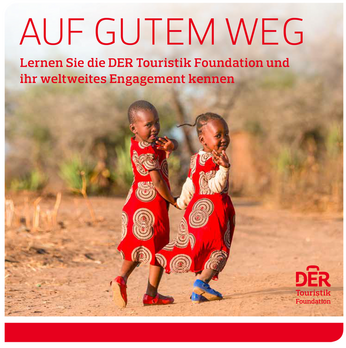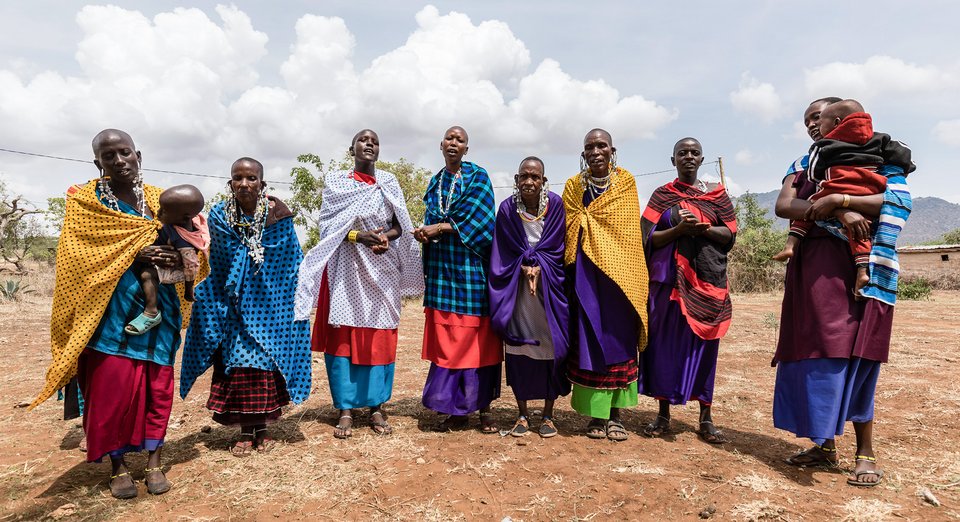
At the end of last year, Sören Hartmann, CEO of DER Travel and Tourism Group, travelled to Tanzania to see for himself the current project successes of the DER Travel and Tourism Foundation - and the special challenges during the pandemic. See and hear his impressions here, and find out more about the projects and plans.
"I am proud of the Foundation's work!" This is how Sören Hartmann, Chairman of the Management Board of the DER Travel and Tourism Foundation and CEO of DER Travel and Tourism Group, summarised his trip to Tanzania. In November 2021, he travelled to the Emboreet region in northern Tanzania to see for himself the work of the various development projects in which the Foundation is involved. The Foundation has been active in the country since 2016. The coronavirus pandemic has made this commitment more important than ever. Time to take stock.
Every year, more than 10,000 travellers from DER Travel and Tourism enjoy the national parks with their fascinating wildlife, the seemingly endless sandy beaches, Mount Kilimanjaro and admire the special Maasai culture. For DER Travel and Tourism, Tanzania is therefore not only a very popular holiday destination, but also a destination for whose people, nature and tourism the travel group bears a special responsibility. Without sustainable tourism, the foundations that make Tanzania so unique will be destroyed.
„I am proud of the Foundation's work!“

Tanzania is facing major challenges: People and animals compete for scarce living space, women are often disadvantaged in the Maasai culture, the infrastructure of schools is poor and unemployment is high. How can this dilemma be solved?
The DER Travel and Tourism Foundation has a clear approach: a complete and economically sustainable cycle must be established in the country. Only those projects that are co-ordinated with those affected locally will be successful. Education programmes are the decisive lever and must not only focus on children, but must involve all sections of the population: Young and old, women and men.
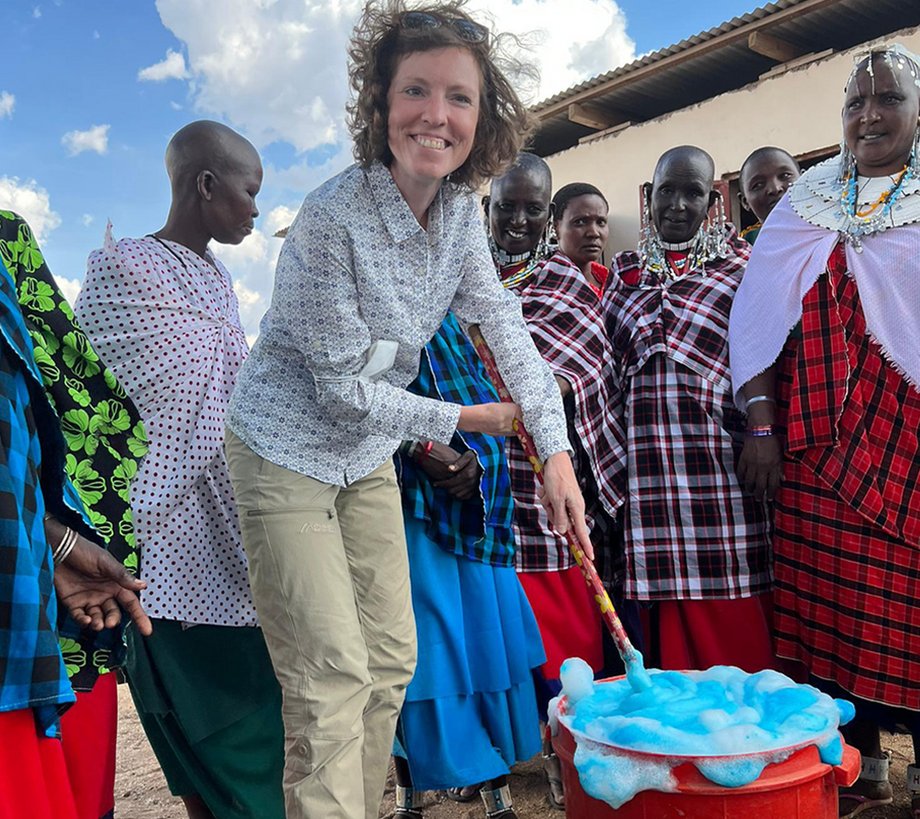 Kathrin Sommer, Sustainability Department at DER Travel and Tourism, making soap
Kathrin Sommer works in the sustainability department at DER Travel and Tourism, where she is responsible for all tasks relating to the Foundation. She accompanied Sören Hartmann on his trip.
Kathrin Sommer, Sustainability Department at DER Travel and Tourism, making soap
Kathrin Sommer works in the sustainability department at DER Travel and Tourism, where she is responsible for all tasks relating to the Foundation. She accompanied Sören Hartmann on his trip.
How did you experience the local people?
Kathrin Sommer: "I was particularly impressed by the infectious joie de vivre, friendliness and gratitude of the people in Tanzania. The past two years have not always been easy for us in Germany either, both professionally and privately, because of coronavirus. However, my time in Tanzania has made me realise once again that we should be grateful much more often for what we take for granted."
What particularly impressed you on the trip?
Kathrin Sommer: "I was personally thrilled by the musical welcome we received everywhere. People love to sing. Important religious, political and cultural messages are often conveyed through song - you realise that immediately. I have rarely heard so many great voices in one place. As I am passionate about singing myself, I had tears in my eyes at one point or another."
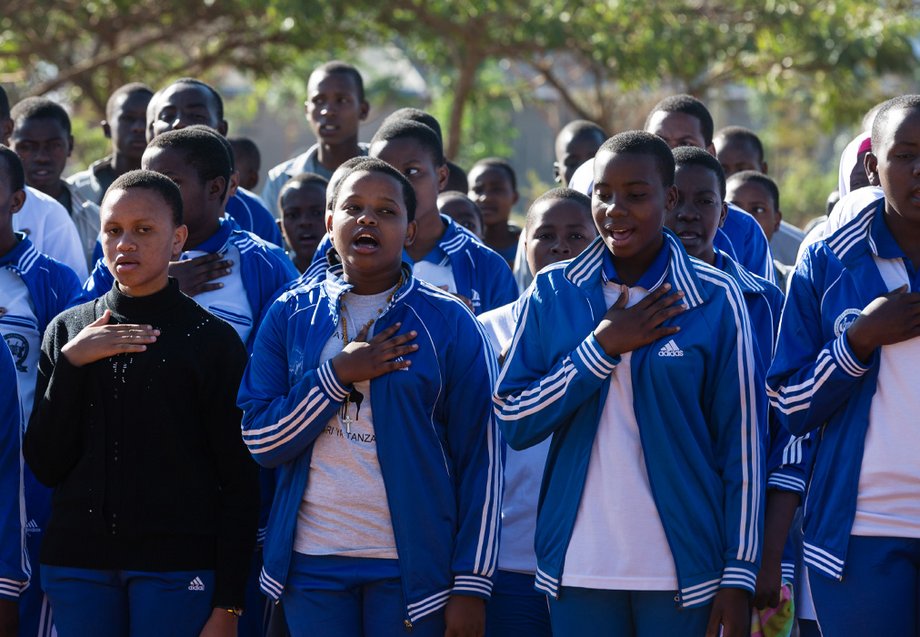 Emboreet secondary school musical reception
Emboreet secondary school musical reception
What next steps are planned for the project work?
Kathrin Sommer: "We are currently developing a training programme for Travel and Tourism professions. I am currently in close dialogue with the project partners on this. This is a very important contribution to our commitment to strengthening the economy and tourism in the long term."
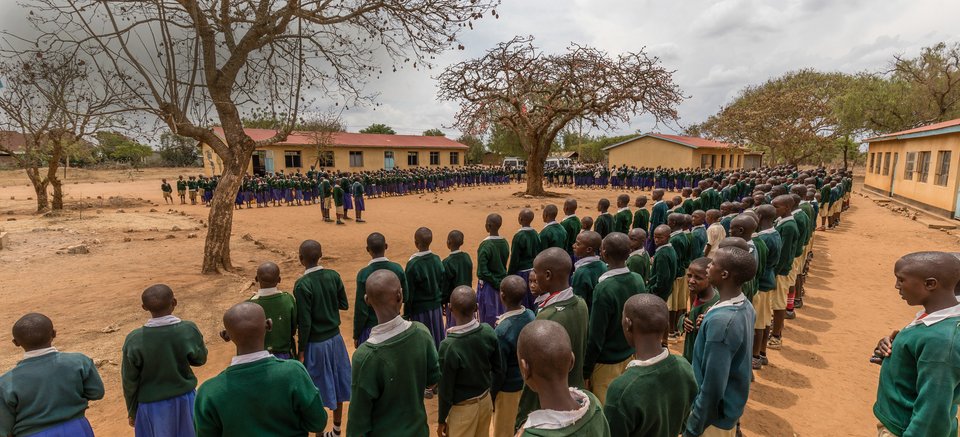
School and vocational training for 3,700 children
Almost five years ago, the Der Travel and Tourism Foundation began its commitment in Tanzania with the construction of schools. Eight schools have now been built and renovated: They enable more than 3,700 children to attend school. The Foundation finances the construction of the schools. The schools are run by the state, which is committed to ensuring a standardised and solid level of education.
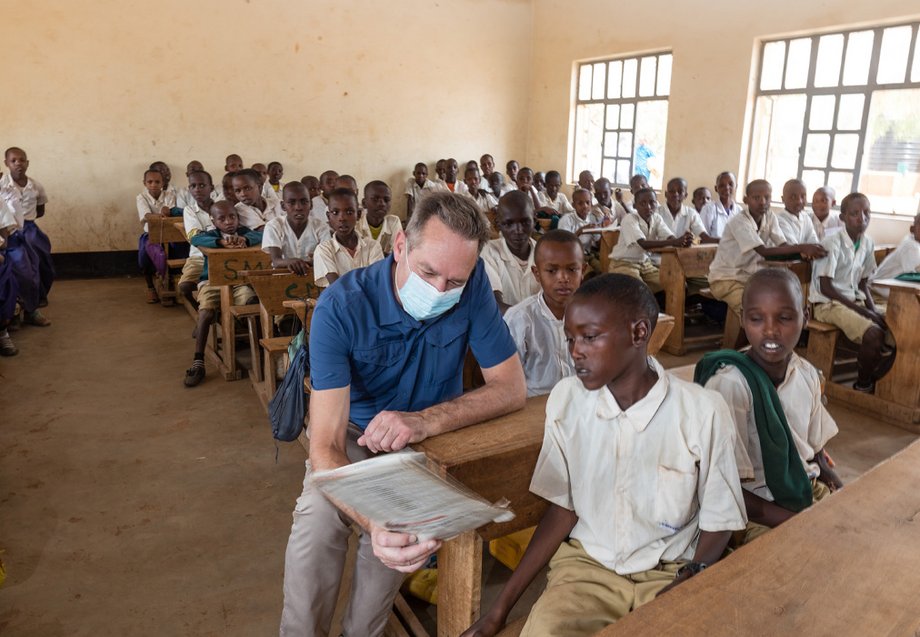 Sören Hartmann with pupils
Sören Hartmann with pupils
However, due to the coronavirus pandemic, many graduates are currently ending up unemployed. The Foundation therefore decided to also support training programmes for young adults. In November, Sören Hartmann and joint project partners were able to open the first craft centre for bricklayers, carpenters and locksmiths. Currently, 64 young men and women are being trained there. However, the centre, which trains urgently needed skilled workers, will not stop there.
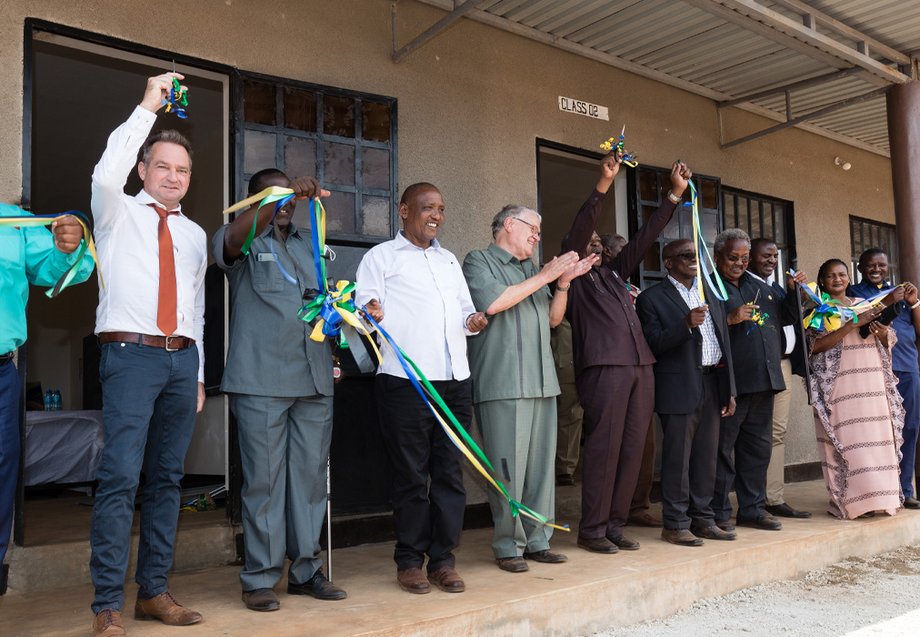 Opening of the craftsmen's centre
Opening of the craftsmen's centre
Women's centre
In order for children and young people to receive an education, mothers in particular must be convinced of the importance of supporting them. However, women can only do this if they themselves receive special support. In Maasai culture, they traditionally have few legal rights, are often married off early without training, have many children and live in social isolation. The DER Travel and Tourism Foundation has therefore set up a women's education centre. A meeting place for women from different tribal groups, where they learn helpful things for daily life, such as hygienic housekeeping or active family planning. They also learn how to set up small businesses from the production of soap and maize flour. In turn, they can use this income to provide their children with an education. Training programmes are already being planned that will enable young people to complete an apprenticeship in tourism and thus counteract the shortage of skilled workers in this sector.
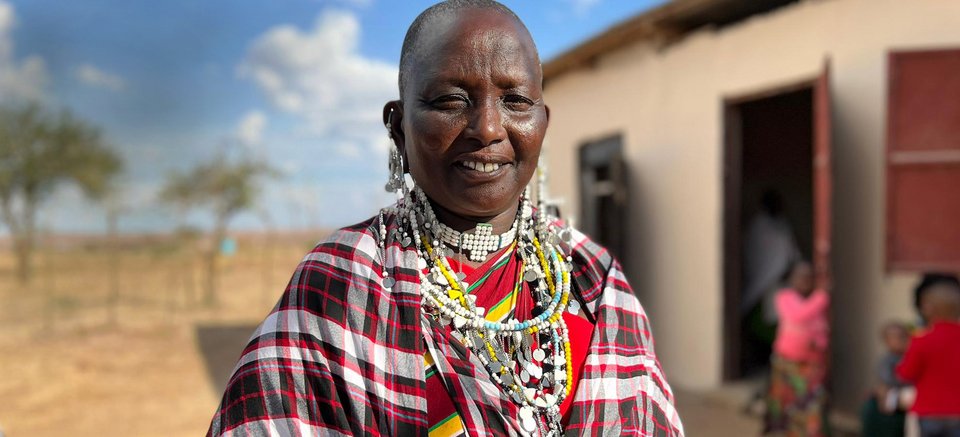
Mamaai Letoo is 55 years old and regularly attends the women's centre. She talks enthusiastically about her experiences: "Since I have been meeting regularly with other women, my life has changed for the better. In the past, we Maasai women all lived quite isolated lives. Now we help each other. The training at the women's education centre and being part of the women's group are a real highlight for me. They bring light into my life!"
Mamaai never went to school and is therefore particularly grateful for the knowledge she has gained: "Now I know how important it is to keep my house clean, to eat from clean dishes and to wear clean clothes, none of which I used to take for granted."
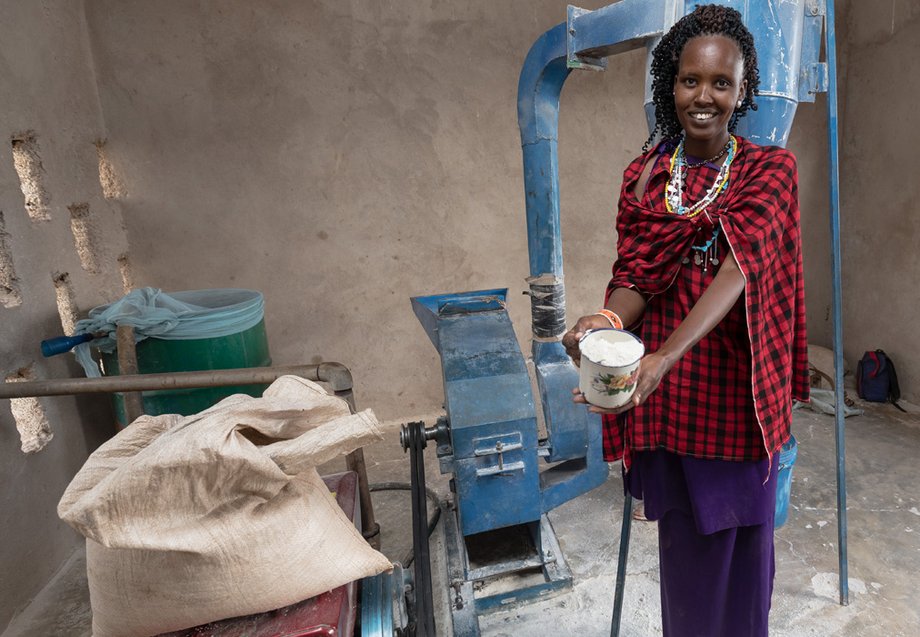 In the production of maize flour
In the production of maize flour
She draws strength and courage from all that she has learnt: "Being independent from my husband is good for my self-confidence! I now do my own shopping and know how to feed my family healthily. What can I say, I even look much better and younger because I dress cleaner and, above all, eat healthier! But the best thing is that I have learnt to make soap and maize flour and earn my own money. I invest this in my children and their education, because education is the most important thing for a good and secure future."
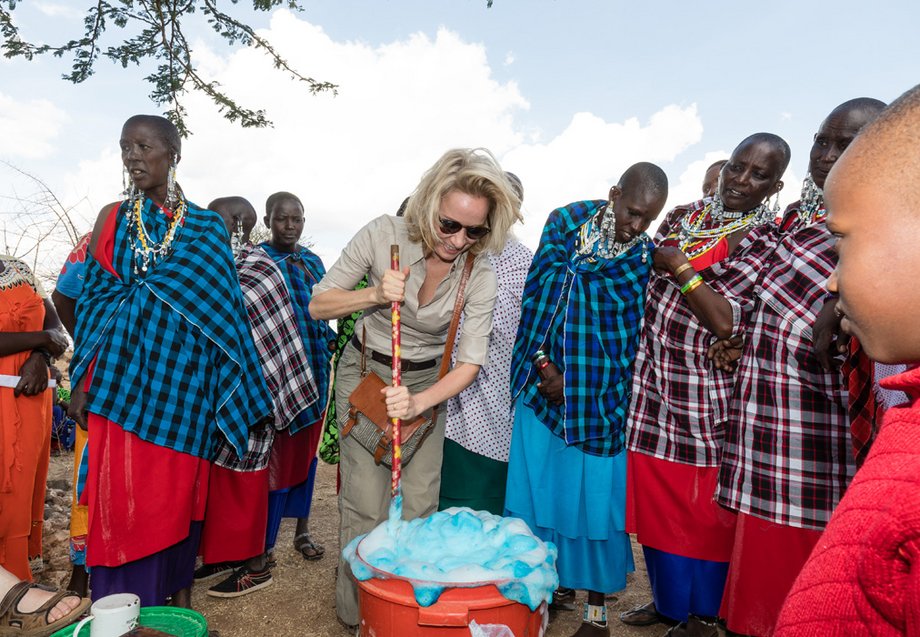 Ulrike Braun, Head of Sustainability at DER Travel and Tourism, making soap
Ulrike Braun, Head of Sustainability at DER Travel and Tourism, making soap
Biodiversity
In Tanzania, people and animals compete for habitats and food. The enormous population growth and the associated increase in settlements and roads means that there is less and less of a buffer between the national parks and the villages. This leads to dangerous conflicts. People see wild animals as enemies that jeopardise their livelihoods. In addition, the wild animals can leave the reserves, which are supposed to protect them from poaching, unhindered, while they represent a border for the Maasai and their livestock, which they are not allowed to cross in search of water and food.
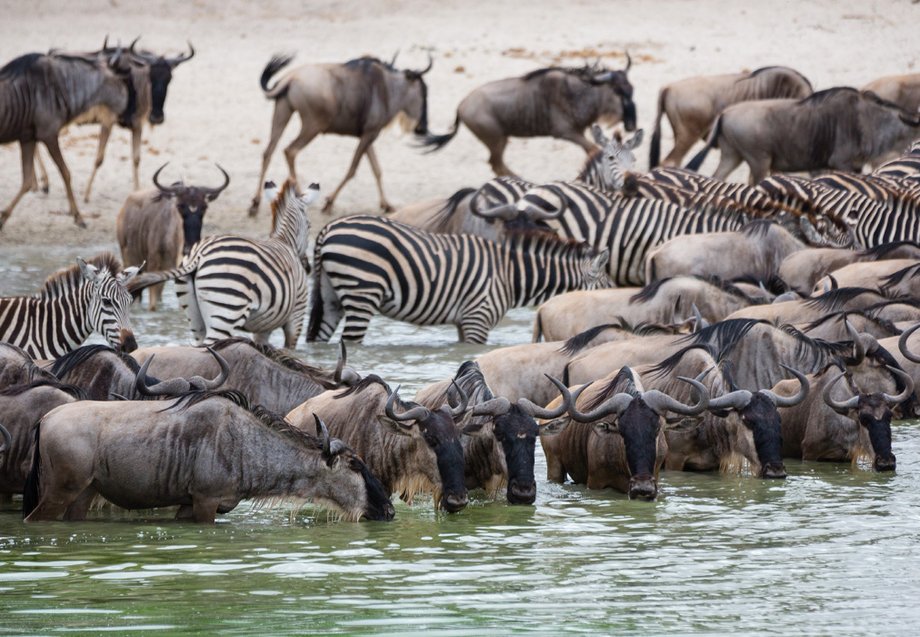
The "Living in Harmony with Nature" environmental programme, in which the DER Travel and Tourism Foundation is also involved, was founded to deal with this major area of conflict. It offers courses designed to sensitise young people to the right approach. Every year, more than 500 young people learn how to avoid poaching.
In practical terms, the work of the programme can be described by a simple but very effective initiative: The construction of chilli fences around agricultural land. They prevent elephants and other wild animals with very sensitive olfactory organs from entering the fields, as the pungent odour is a horror for them.
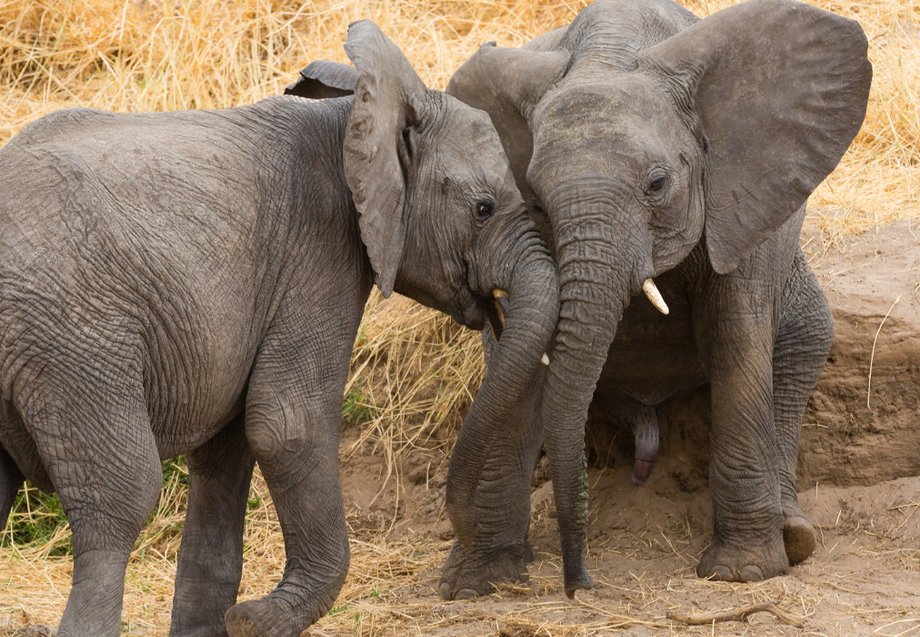
The majority of locals cannot afford entry to the national parks. Children and young people who are given the opportunity to visit through the environmental programme are often amazed at how relaxed and calm the encounters between animals and people in the reserves are. An important experience that shows them that there doesn't always have to be conflict.
"Living in Harmony with Nature" teaches children and young people how they can protect wildlife and nature and improve their own lives by living in harmony with them. They also learn that tourism is an important source of income that their country needs. They pass this knowledge on to their families, making them valuable multipliers.
Read more about the DER Travel and Tourism Foundation and its projects in the new brochure and here in one:

